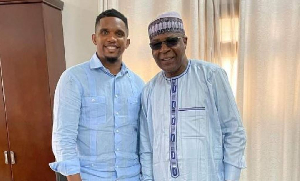Unlike all other French speakers who mounted the rostrum at the official opening of the 60th Commonwealth Parliamentary Conference (CPC) in Yaounde Monday, President Paul Biya of Cameroon cum Vice Patron of the Commonwealth Parliamentary Association CPA refused to utter a word in English.
Even the Speaker of the National Assembly and acting President of the CPA Cavaye Yeguie Djibril and Senate President Marcel Niat Njifenji who rarely address their assemblies in English made an exception during the opening of the CPC at the Yaounde Conference Centre. In much difficulty, both struggled to deliver their speeches in English.
All who expected President Biya to incarnate the bilingual nature of Cameroon at the conference had their hopes dashed out abysmally. Is it that Mr Biya cannot speak English? The answer in NO! But critics say in a conference dominated by English speaking delegates, it was only normal for the president of a bilingual country to say even some few words in English.
In his remarks, Biya said Cameroon is delighted to have been chosen to host the 60th Commonwealth Parliamentary Conference, adding that the massive turnout of Commonwealth Members of Parliament is an eloquent testimony to their interest in fostering solidarity among the peoples they represent.
He said the Post-2015 Agenda – focus of the conference - should devise new strategies to substantially improve the population’s living conditions. “All players will need to demonstrate a stronger political will, greater generosity and more effective, more concrete and more active solidarity.
Such are the demands of the interdependence of States and unity of humanity on us. Without this extra touch of the soul, development by the end of the new Agenda may remain a distant goal,” Biya added.
The conference is scheduled to end on October 10. It must be recalled that the Commonwealth of Nations is a voluntary association of 53 independent and sovereign states. No one government in the Commonwealth exercises power over the others as is the case in a political union.
Rather, the relationship is one of an international organisation through which countries with diverse social, political, and economic backgrounds are regarded as equal in status and cooperate within a framework of common values and goals as outlined in the Singapore Declaration issued in 1971. Cameroon joined the organisation in 1995.
Actualités of Tuesday, 7 October 2014
Source: cameroon-info.net













